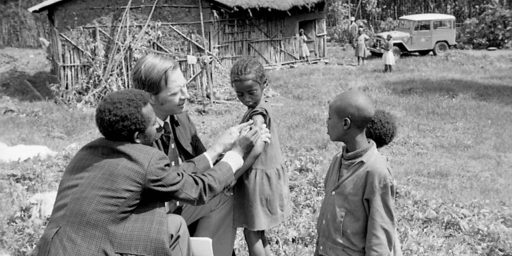MYSTERIOUS BLOD CLOTS
United Press International reports some disturbing news from Iraq:
Unexplained blood clots are among the reasons a number of U.S. soldiers in Operation Iraqi Freedom have died from sudden illnesses, an investigation by United Press International has found.
In addition to NBC News Correspondent David Bloom, who died in April of a blood clot in his lung after collapsing south of Baghdad, the Pentagon has told families that blood clots caused two soldiers to collapse and die. At least eight other soldiers have also collapsed and died from what the military has described as non-combat-related causes.
A disturbing parallel has also surfaced: soldiers becoming ill or dying from similar ailments in the United States. In some cases, the soldiers, their families and civilian doctors blame vaccines given to them by the military, particularly the anthrax or smallpox shots.
Some of the soldiers who died suddenly had complained about symptoms suffered by Bloom — including pain in the legs that could indicate problems with blood clots.
“If there is a significant number of deaths of this type, it would make you wonder what was going on,” said Rose Hobby, whose brother-in-law, Army Spc. William Jeffries, died of a massive lung blood clot and swelling of his pancreas on March 31 after being evacuated from Kuwait.
Most bizarre.





Well, the questions that come to my mind are:
– What is the prevalence of this condition on a similar population, i.e. the same number of people (mostly men) in the same age groups that
a) Are deployed in the military in non-Iraq areas (Korea, Europe, Japan, etc.)
b) Are not in the military at all (i.e. U.S. population)
– If it is different (my impression is that it is higher with the Iraqi deployed people, but I really don’t know), what is different about this population. Everything from vaccines (are they different from the ones given to people stationed at the DMZ?) to different foods, to anything strange these people passed through (did these guys go by any former “labs” with stuff maybe still hanging around).
Bascially some scientific investigation…
Sure. The piece itself asks some of those questions but gives no conclusive answers. As a Gulf War I vet, I’m still unconvinced that there is a Gulf War Syndrome. But it’s an interesting phenomenon, anyway.
These sorts of things tend to get magnified out of all reality, thanks to the news-hungry media.
For example, there was this recent flap over whether the smallpox vaccine was causing heart issues in adults. A study of millions of adults in NY City vaccinated with very similar (if not identical) vaccine in the late 1940s showed no increase in heart-related issues–or any other side-effects for that matter, making the smallpox vaccine one of the safest known. Further, none of the doctors who used to administer it in the 60s and 70s reported any issues with their patients. This makes it extremely unlikely there are any major issues with the vaccine, even in today’s paranoid environment.
Similar issues exist with “Gulf War Syndrome”. The symptoms are so vague and indefinite that almost anyone could be diagnosed with it. Another recent study showed that some doctors were willing to diagnose people who hadn’t been in the Gulf War at all with GWS, indicating there are likely to be plenty of false positives.
That’s not to say there isn’t some weird syndrome with the blood clot stuff, but it’s pretty unlikely; we’ll just have to wait until some real data comes in. I’m just hoping this also doesn’t get blown all out of proportion.
The reporter who died got the clot in a perfectly ordinary way: sitting in a confined space (the back of a truck) for a very long time. He then ignored suggestions he might want to get his unexplained leg pain looked at, as people traveling crammed in the backs of trucks were at risk for clots. I think this is a non-story. There are 146,000 troops in Iraq. 10 collapsing and dying is likely about par for the course, given rough conditions.
—